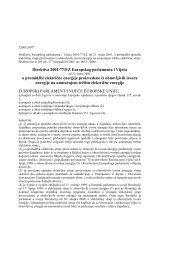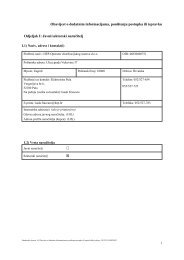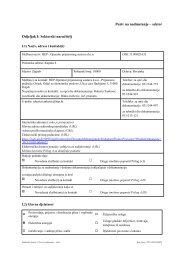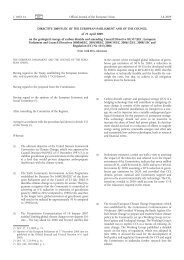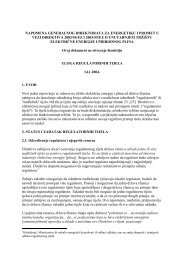Untitled
Untitled
Untitled
You also want an ePaper? Increase the reach of your titles
YUMPU automatically turns print PDFs into web optimized ePapers that Google loves.
Hrvatska je na poËetku uvoappleenja ekonomske regulacijeu energetskim djelatnostima, stoga se uovom trenutku joπ ne mogu analizirati uËinci regulatornepolitike u cijelosti kao niti pojedinih regulatornihodluka. Iako su tarifni sustavi, bez visinetarifnih stavki, doneseni u prosincu 2006. godine,koliko je poznato autorima (u vrijeme predaje ovogËlanka uredniπtvu) procedura donoπenja iznosa tarifnihstavki nije joπ zapoËela. Za donoπenje iznosatarifnih stavki potrebno je prije svega da energetskisubjekti HEP Operator prijenosnog sustava d.o.o.(HEP OPS) i HEP Operator distribucijskog sustavad.o.o. (HEP ODS) dostave HERA-i na suglasnostprijedlog trogodiπnjih planova razvoja i izgradnje,a sve temeljem Zakona o træiπtu elektriËne energije[8].Kod razmatranja planova razvoja i izgradnje prijenosnei distribucijske mreæe, nameÊe se pitanjekoje se odnosi na dubinu nadleænosti regulatornogtijela, pa tako i HERA-e, odnosno na njegovu pozicijuu odnosu na davanje suglasnosti na pojedinakoncepcijska rjeπenja, odnosno na pojedina tehniËkapitanja. Naime, temeljem Zakona o træiπtuelektriËne energije [8] HEP OPS i HEP ODS donoseplanove razvoja i izgradnje mreæa za razdobljeod tri godine tek po ishoappleenoj prethodnoj suglasnostiHERA-e na svoje prijedloge planova. Doneseniplanovi ujedno su i ishodiπte za utvrappleivanjeiznosa tarifa. Samim zakonskim odredbama nijerazvidno definirana dubina uloge HERA-e u smislunjenih ovlasti prilikom davanja tih suglasnosti.BuduÊi da su iskustva u Hrvatskoj u smislu utjecajaregulatornog tijela na planove razvoja i izgradnjetek u zaËetku, zanimljivo je analizirati ulogu drugihregulatornih tijela u donoπenju planova poslovanja,tj. razvoja i izgradnje subjekata koji obavljajuregulirane djelatnosti. Iskustva regulatornih tijelaËlanica udruæenja energetskih regulatornih tijela izEurope (Energy Regulators Regional Association ∑ERRA) [9], u kojima je regulacija i konkurentnotræiπte elektriËne energije relativno novi koncept,vrlo su razliËita u smislu uloge regulatornog tijela udavanju suglasnosti na planove razvoja i izgradnje.U veÊini sluËajeva regulatorna tijela ne utvrappleujukriterije planiranja razvoja prijenosne i distribucijskemreæe, niti utjeËu na koncepcijska i tehniËkarjeπenja koja vrlo Ëesto proizlaze iz odluka upravetvrtki, veÊ se njihova uloga svodi na odobravanjeposlovnih planova Operatora prijenosnih sustava(OPS) i Operatora distribucijskih sustava (ODS).Paralelno odobravanju poslovnih planova, regulatornatijela postupno uvode i razvidne kriterijekvalitete opskrbe kako bi se izbjeglo smanjenjekvalitete opskrbe zbog smanjivanja troπkova krozprimjenu regulatorne metode te da bi se ujednopostiglo planiranje razvoja mreæe koje za cilj imaThe Republic of Croatia is in the initial phase ofintroducing economic regulation into energy activities.Therefore, at this moment it is still not possibleto analyze the effects of the regulatory policyin their entirety or individual regulatory decisions.For the adoption of the amounts of tariff items, itwill be necessary for the HEP Transmission SystemOperator ∑ HEP TSO (HEP Operator prijesnog sustavad.o.o. ∑ HEP OPS) and the HEP DistributionSystem Operator ∑ HEP DSO (HEP Operator distribucijskogsustava ∑ HEP ODS) as energy entitiesto submit their proposed three-year developmentand construction plans to the CERA for approval, allpursuant to the Electricity Market Act [8].When considering the development and constructionplans of transmission and distribution networks,a question arises in reference to the degreeof the authority of the regulatory body, and thusof the CERA, i.e. its position in relation to issuingapproval for individual conceptual solutionsor individual technical questions. Pursuant to theElectricity Market Act [8], the transmission systemoperator and the distribution system operator onlyadopt plans for the development and constructionof networks for a period of three years after obtainingprior approval from the CERA for their proposedplans. The adopted plans are also the basis for thedetermination of the amounts of tariffs. The legalprovisions themselves have not transparently definedthe range of the CERA's role in the sense ofits authority when issuing these approvals.Since experiences in the Republic of Croatia regardingthe influence of the regulatory body on developmentand construction plans are only in the initialphase, it is interesting to analyze the role of otherregulatory bodies in the adoption of business plans,i.e. development and construction by entities performingregulated activities. The experiences of themember regulatory bodies of the Energy RegulatorsRegional Association (ERRA) [9], in which regulationand a competitive electrical energy market are relativelynew concepts, vary considerably in the sense ofthe role of the regulatory body in issuing approval fordevelopment and construction plans. In the majorityof cases, the regulatory bodies neither determine thecriteria for planning the development of transmissionand distribution networks, nor do they influence theconceptual and technical solutions that very oftenensue from the decisions of company management,but instead their role is limited to approving thebusiness plans of the transmission system operatorand the distribution system operator. Together withthe approval of business plans, regulatory bodiesare gradually introducing transparent criteria for thequality of supply in order to avoid lowering the qualityof the supply due to reduced expenditures throughthe application of regulatory methods in order to557Štritof,I., KleËina, F., Regulatorna politika i njen utjecaj ..., Energija, god. 56(2007), br. 5., str. 554-583Štritof, I., KleËina, F., Regulatory Polica and Its Impact ..., Energija, vol. 56(2007), No. 5, pp. 554-583






